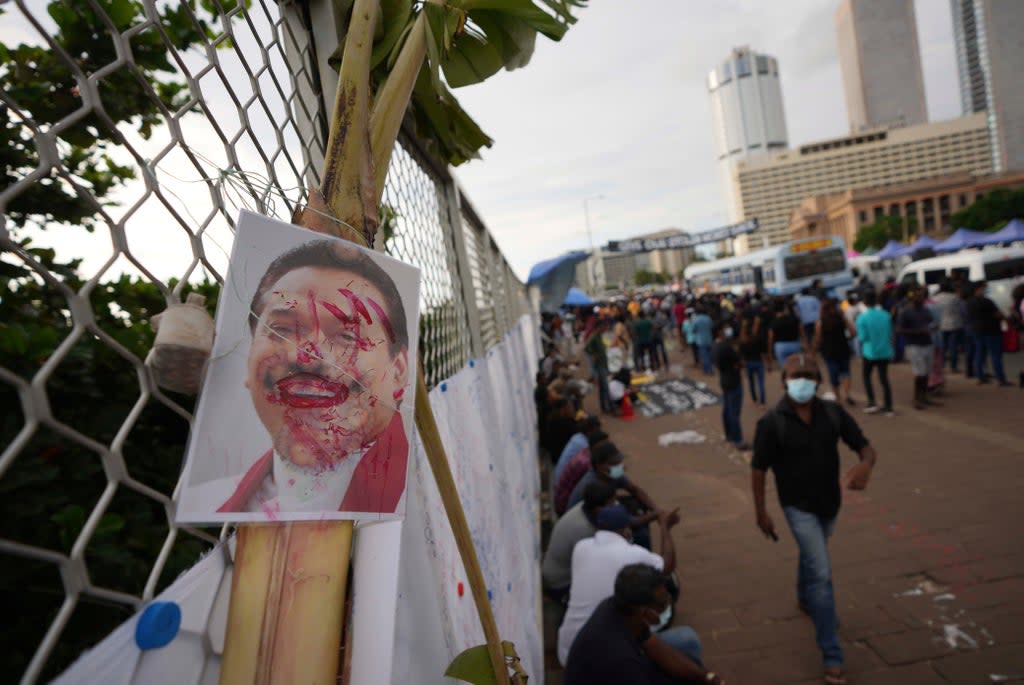Voices: Sri Lanka’s President Rajapaksa makes Boris Johnson look like a paragon of virtue

- Oops!Something went wrong.Please try again later.
- Oops!Something went wrong.Please try again later.
- Oops!Something went wrong.Please try again later.
Arrogant and out of touch, never known to apologise, he has led his country to the brink of disaster. No, not Boris Johnson (or even Rishi Sunak) but Sri Lankan leader Gotabaya Rajapaksa, a man who makes the British prime minister look like a paragon of integrity.
Imagine hundreds of angry voters camping out at Parliament Square and haranguing MPs with shouts of “Boris go home”. Maybe there are a few there already. If you had to queue all night for petrol and had just seen your bank savings wiped out, you might feel like joining them.
For weeks, Sri Lankan protesters have been encamped on the Colombo promenade, agitating for change. The country is bankrupt and voters are in no doubt about who is to blame. Shouts of “Gota go home” have become their rallying cry. Some of them may even have heard of Boney M.
Gota does not want to go home. He is stubbornly resisting calls to resign as president, insisting that he can bring Sri Lanka back from the brink.
Unfortunately, that looks about as likely as Boris owning up to a Covid misdemeanour. Sri Lanka has no money to pay for fuel, medicine and dozens of others essential imports. Foreign reserves, £6bn two years ago, are down to less than £40 million, lower even than Zimbabwe. That takes some doing.
Tourism has always been Sri Lanka’s lifeline, with huge numbers of Brits falling under the island’s spell. All that money coming in kept the country afloat but the Easter 2019 bombs and two years of Covid lockdowns scuttled the ship. Tourist arrivals were just starting to pick up, led, surreally, by Russia and Ukraine, when President Putin decided that he might as well destroy Sri Lanka along with the rest of the world.
The fall in tourist revenues has left Sri Lanka teetering on the brink. The tiny island nation, which owes China billions of dollars, used up the last of its foreign reserves trying to keep the Sri Lanka rupee at a fixed rate. When it abandoned this exercise in futility, the currency went into freefall.
Prices of food and groceries have quadrupled and many items are unobtainable. Oil tankers waiting out at sea are demanding cash upfront before unloading, leading to critical shortages of fuel. Power stations, which run on diesel, have been imposing several hours of daily power cuts for months now.
Desperate Sri Lankans have vented their anger at the Rajapaksas, originally rich southern rice farmers, who have dominated the island’s politics for years. The family figurehead, Mahinda Rajapaksa, 76, put his siblings into all the powerful positions, installing his younger brother Gotabaya, 72, as president three years ago.
That appointment was a disaster from the outset. One of Gota’s most damaging acts was to declare a ban on chemical fertiliser, ordering farmers to switch overnight to organic farming, about which they knew nothing. The rice harvests failed, erasing all support for the Rajapaksas among the farmers.
Anger against the government has been rising steadily since the March currency devaluation. Gota tried to buy time by ridding his cabinet of all other Rajapaksas – Mahinda was the last to go, resigning as prime minister 10 days ago – but the strategy has not worked. The protesters want him gone.
To keep up to speed with all the latest opinions and comment, sign up to our free weekly Voices Dispatches newsletter by clicking here
Last week, thousands of pro-Rajapaska supporters arrived by bus and attacked the Colombo protesters. In the ensuing chaos, buses were set on fire and pushed into the Colombo lakes and MPs’ homes all over the island, including the Rajapaksa ancestral home down south, were burnt to the ground. Mahinda had to be rescued from his official residence and taken “for his safety” to the naval base at Trincomalee.
Gota’s current strategy is to hide behind the newly-appointed prime minister Ranil Wickremesinghe, an opposition stalwart criticised for being too close to the Rajapaksas. Few of the “Gota go home” crowd have been taken in by this ruse.
Many expect the Rajapaksas to skip the country, although a court in Colombo has imposed travel bans on MPs including Mahinda. One Rajapaksa ally is reported to have left the island by boat to Malaysia. Others may try to flee to India.
The Sri Lankan story is not going to end well. The coming months will bring tax rises, job cuts and huge increases in electricity bills – measures insisted upon by the International Monetary Fund (IMF) in return for emergency loans. The same thing happened recently in Kenya, and you won’t hear Kenyans saying anything positive about the IMF.
Britain’s prime minister, meanwhile, should consider himself lucky to be living in a country which is not quite on its deathbed, if not far off. Boris go home? He just might.

